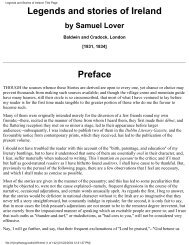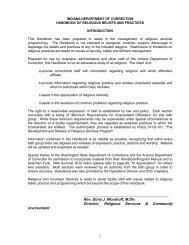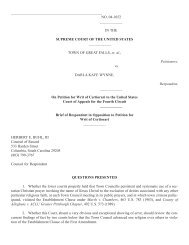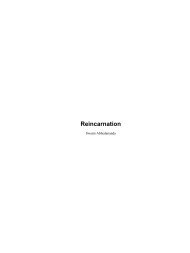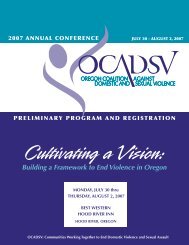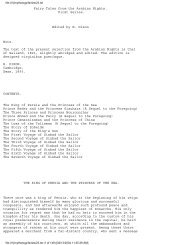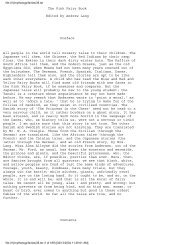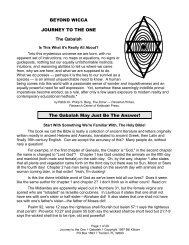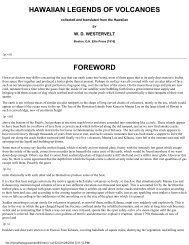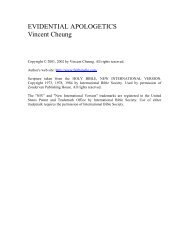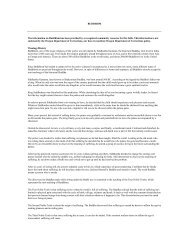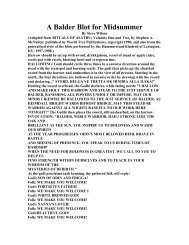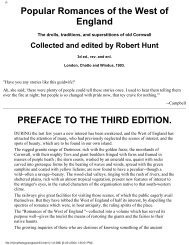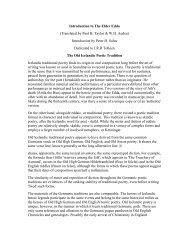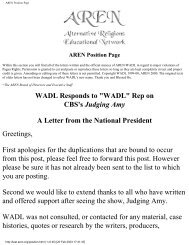Irish Druids And Old Irish Religions PREFACE CONTENTS
Irish Druids And Old Irish Religions PREFACE CONTENTS
Irish Druids And Old Irish Religions PREFACE CONTENTS
You also want an ePaper? Increase the reach of your titles
YUMPU automatically turns print PDFs into web optimized ePapers that Google loves.
"The Celtic priests, or <strong>Druids</strong>," says he, "who, like the Egyptian priests, had adopted the Chien-Levrier for a symbol, called themselves the<br />
ministers of an Unknown God, descended, it is said, upon earth, as Thoth, under a human form, and having all the characteristics of that<br />
Egyptian god, with the head of a dog; benefactor of Humanity, Supreme--civilizing Legislator, Poet and Musician, King of Bards,<br />
Inventor and Protector of Agriculture, Regulator of Waters, Protector in Darkness, raised to the Presidency in a circle of stones, Founder<br />
of sacred ceremony, Model-priest, invoked under the name of Father."<br />
All that is very Welsh, and cannot be applied to Ireland. The Welsh Triads have had claimed for them a greater age than modern critics are<br />
disposed to allow. Many of the Welsh gods therein recorded are of doubtful pagan origin, and belonged rather to the mysticism that crept<br />
into Europe from the East during the early Middle Ages.<br />
The <strong>Irish</strong>--except where their Bards came under the influence of the same wave of oriental or Gnostic learning--of olden time knew little<br />
of Addon, the seed-bearer in himself; Ammon without beginning; Celi, the mystery; Deon, the just: Duv, he is: Dovydd. regulator; Deon,<br />
separate<br />
p. 132<br />
One; Dwyv, I am; Daw, being; Gwawr, dawn of day; Gwerthevin, supreme; Ton, source; Tor, one of yore; Nudd, manifest; Perydd, cause;<br />
Rhen, pervader; Rhwyf, overlooker, &c.<br />
There is no mention of their recognition of the Three Attributes--Plennydd, Alawn, and Gwron, indicated by the three divergent rays. They<br />
had no Circle of Ceugant as the infinite space; nor did they look upon the cromlech as representing, in three stones upholding the<br />
cap-stone, the doctrine of Trinity in Unity.<br />
We cannot conceive of an <strong>Irish</strong> bard writing, as did a Welsh bard, of Ceridwen--"Her complexion is formed of the mild light in the<br />
evening hour, the splendid, graceful, bright, and gentle Lady of the Mystic Song." But we do know that the early Crusaders brought home<br />
much of this mystic talk from the East, and that ecclesiastics of an imaginative turn were charmed with pseudo-Christian gnosticism. The<br />
<strong>Irish</strong> pagan, as the Welsh pagan, was ignorant of such refinement of speech or ideas. The Welsh Archdruid assured the writer of his belief<br />
that so-called pagan philosophy was the source of Bardism, that the teaching of the Triads was but the continuation of a far older faith in<br />
his fathers.<br />
Ossian more properly pictures the opinions of his race in Ireland and Scotland, though they are rather negative than affirmative. He,<br />
doubtless, never entered the esoteric circle of Druidism, and is very far from displaying any tincture of mysticism in his verses.<br />
His gods were hardly spiritual, but vulnerable; as, when Fingal fought the Scandinavian Deity, that shrieked when wounded, "as rolled<br />
into himself, he rose upon the wind." Yet the gods could disturb the winds and waves, bring storms on foes, and so destroy them. Dr. Blair<br />
was struck with the almost total absence of religious ideas in Ossian.<br />
p. 133<br />
Even at the funeral, in Temora, we have only, "Loud at once from the hundred bards rose the song of the tomb."<br />
He lived in the age of Christianity. Hear the challenge of the wild Northmen--"Are the gods of the Christians as great as Loda (Odin) of<br />
the Lochlins?" Dr. Donald Clark fancied that in Ossian's day the people had lost faith in their old Druidic religion, but had not then<br />
embraced Christianity.<br />
The remarks of Dr. H. Waddell are entitled to careful attention. Referring to Ossian, he says--<br />
"All local gods, to him, were objects of ridicule. He recognized the Deity, if he could be said to recognize Him at all, as an omnipresent<br />
vital essence, everywhere diffused in the world, or centred for a lifetime in heroes. He himself, his kindred, his forefathers, and the human<br />
race at large, were dependent solely on the atmosphere; their souls were identified with the air, heaven was their natural home, earth their<br />
temporary residence, and fire the element of purification, or the bright path to immortality for them when the hour of dissolution<br />
came.--The incremation of Malvina's remains, on the principle of transmutation, and escape from dark, perishable clay to luminous and<br />
immortal ether, is a beautiful illustration of this."<br />
After all, one is constrained to admit with Ernest Rhys--"I for one am quite prepared to believe in a Druidic residue, after you have<br />
stripped all that is mediæval and Biblical from the poems of Taliesin." So it is with Ossian, or other bards of <strong>Irish</strong> origin. With all that has<br />
been accumulating of a mediæval character, from the hands of supposed transcribers and translators, there yet remains something of the<br />
primeval barbaric conception of religion in the grand old tales of Erin.<br />
In the Bardic story of the Battle of Gabhra we read--"I return my thanks to the gods."<br />
p. 134<br />
This led N. O'Kearney to observe--"From this passage it is evident that the pure monotheism of the <strong>Druids</strong> had dwindled down into a<br />
vulgar polytheism, previous to the date of the Fenian era. Historians assert that Tighernmas was the first monarch who introduced<br />
polytheism, and that a great multitude of people were struck dead. on the worship of strange gods. The sun, moon, stars, elements, and<br />
many animals that were adored by the Egyptians, were introduced as deities."<br />
file:///I|/mythology/witchcraft/8/8.html (48 of 114) [02/05/2004 8:38:14 AM]



